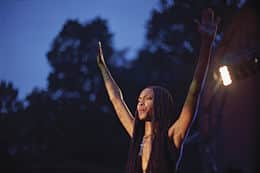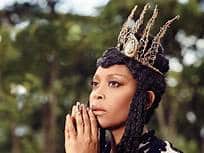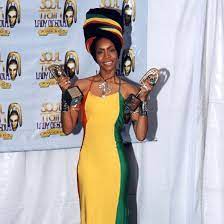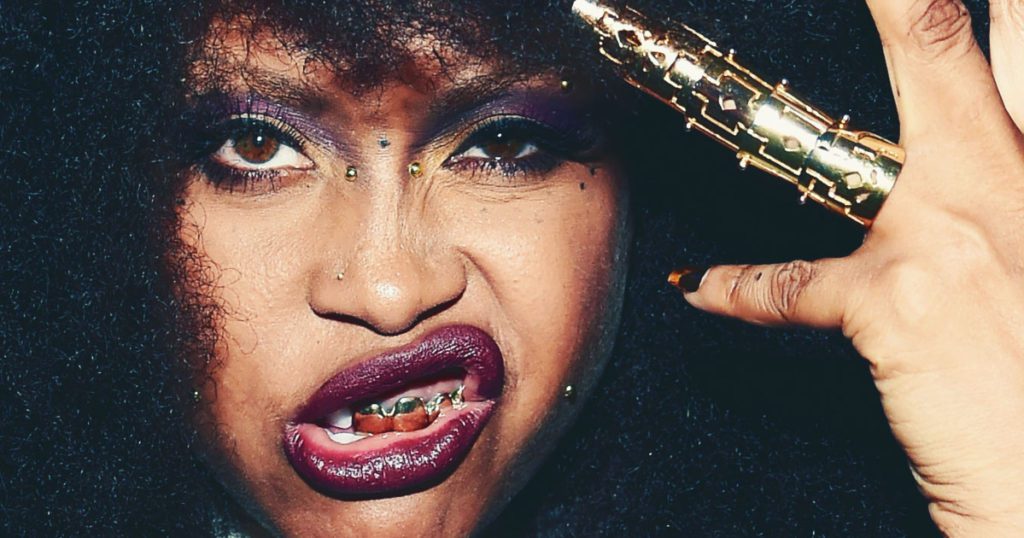Thesis Statement
Erykah Badu is recognized for her soulful music, which is demonstrated on albums like “Baduizm,” which won a Grammy Award, and her follow-up, “Live.” She was one of few who changed the sound of soul music in the late 1990s and the early 2000s.
Artist History
During a time when women’s rights and civil rights were an ongoing fight, artist Erykah Badu was born. Erica Abi Wright is her birth name however, she altered her first name from Erica to Erykah, the “kah” is an Egyptian term for one’s “inner self,” and “badu” is her favorite jazz-riff scat sound. She was born in the city of Dallas on February 26, 1971. Badu was exposed to the arts at a young age because of her mother, actress Kolleen Maria Gipson. From an early age, she performed dances and songs for her mother. Later, she started appearing in plays at the Dallas Theater Center. Badu decided to enroll in Booker T. Washington High School for the Performing and Visual Arts when it was time for her to start high school. She excelled in the arts magnet school where she concentrated on singing and dancing. During this period, Badu was also involved in the Dallas music scene and even started freestyling on a small Dallas radio station as DJ Apples. After high school, Badu enrolled at Grambling State University, a historically black college in Grambling, Louisiana. She studied quantum physics as a minor while majoring in theater. In 1993, Badu left Grambling to focus on her music career. She relocated back to Dallas, where she taught theatre and worked as a waiter while she made a demo.

Professional Career
................................................................................... Early...........................................
Kedar Massenburg, who was launching his own record label at the time, became aware of Badu in 1995 while the band was serving as the opening act for singer D’Angelo. When Massenburg offered her a contract, Badu disbanded Erykah Free because she believed that a smaller label would give her more individualized attention as a solo artist. Badu states in an interview “Kedar understood what I was trying to do. I signed with him because I think there were only two people on the label, and he made me feel my project would get the energy it needed”. “On & On,” Badu’s debut single, was released in January 1997 and soon rose to popularity. Her debut album, Baduizm, which she wrote all but one of the tracks for, was released the following month.
.....................................Middle........................................................................................
In the late 1990s Erykah Badu opened her musical sanctuary. Baduizm was a way of life and an attractive Soul music presentation that stood out from the majority of what was available. The LP was a huge global success despite its refusal to follow a relatively formulaic period of music (particularly in popular R&B). Badu highlighted uniqueness, introspection, and pure talent. Massenburg tells billboard 100 “As soon as I heard “On & On,” I knew that I had to get involved, The thing that struck me immediately was the beginning, because Erykah had used a beat in the intro that Daddy O, a member of a group I managed called Stetsasonic, had created: Audio Two’s ‘Top Billin.” later in the interview he continues to state “I first played ‘On & On’ for D’Angelo in my car, and he was like, ‘Yo, Key’, man,… she’s incredible, you gotta let me produce the album.’ I said, “Nah, D, you couldn’t even finish your own album! You think I’m gonna think I’m gonna let you produce Erykah?” Badu career was taking off and everyone wanted in.


.............................Later...................................................................................................
Mama’s Gun, Badu’s third album, was released in 2000. The songs Erykah Badu composed for her third album, Mama’s Gun, represented a significant lyrical shift in her music and a growing sense of self-assurance in her personal life. Her romantic engagement with Andre 3000 ended about halfway through the writing process, which prompted a lot of introspection and thought about what it means to be a successful black musician and a single mother of one’s own. After taking some time off to raise her child, Badu made a comeback with Mama’s Gun in 2000. This album, which was primarily produced by the Soulquarians and well-known bassist Pino Palladino and had a more natural sound than her previous studio album, was her first since taking some time off to raise her child. A remix of “Bag Lady” served as the album’s first single and spent seven weeks at the top of the R&B charts. The album was well received, and various media outlets praised the lyrical content because some of her prior works were difficult to grasp. Despite not reaching as high a peak as her first two albums, Mama’s Gun was another platinum-selling hit, and “Bag Lady” was nominated for a Grammy Award. However, there is surprisingly little animosity in her lyrics, which examine the wonder and complexity of love and heartbreak on songs like “Orange Moon,” “In Love With You,” and the especially impressive “Green Eyes,” which sheds light on the jealousy, insecurity, and denial that plague her deteriorating relationship. After Mama’s Gun and Love of My Life were released, Badu experienced a period of writer’s block. In order to find motivation to write and perform new songs, she embarked on what she called the “Frustrated Artist Tour” throughout 2002 and a large portion of 2003. After the tour, Badu returned to the recording studio with fresh songs, and the Worldwide Underground was published in September 2003. Badu was described as noting that the album was intended to function as one continuous groove and was more jam-oriented than any of her previous offerings. Soon after its release, Worldwide Underground rose to #3 on the Billboard charts and was given a gold certification.
Contemporaries
- D’Angelo.
- Lauryn Hill.
- Bahamadia.
- Bilal.
- Jill Scott.
- Meshell Ndegeocello.
- Shafiq Husayn.
- Van Hunt.
- Om’Mas Keith
- Poppy Ajudha
- Y’akoto
- Alicia Keys
- Alta
- Ana Tijoux
- André 3000
- Asa
- Noname

Influences
- Miles Davis
- Al Jarreau
- Chaka Khan
- Stevie Wonder
- Marvin Gaye

Awards
- Grammy Award for Best R&B Song. 10. Soul/R&B New Artist
- Grammy Award for Best Rap Performance by a Duo. 11. MTV Video Music Award for Best Art Direction
- BET Award for Video of the Year 12. NAACP Image Award for Outstanding New Artist
- Grammy Award for Best Female R&B Vocal Performance 13. Soul Train Music Award for Best Album of the Year
- NAACP Image Award for Outstanding Music Video 14. Soul Train Music Award for Best Female R&B Artist
- Soul Train Music Award for Best New Artist 15. Soul Train Music Award for Video of the Year
- BET Award for Video Director of the Year 16. Soul Train Music Award for Best Female R&B Album
- NAACP Image Award for Outstanding Female Artist 17. Soul Train Music Legend Award
- Soul/R&B New Artist 18. Grammy Award for Best R&B Album
Social Involvement
By converting the run-down Black Forest Plays in downtown Dallas into a venue for charitable events and theater in 2003, Badu started to give back to the neighborhood where she had grown up. It would also function as the headquarters for B.L.I.N.D. (Beautiful Love Incorporated Nonprofit Development), a nonprofit organization she established in 1997 to promote change in inner-city communities via the introduction of culture and the arts. While acknowledging the “growing pains” that would haunt them in the years to come, the song’s conclusion offers a clear perspective on the doomed nature of their relationship. Since the beginning of B.L.I.N.D. in 2003, Erykah has established herself as a unique celebrity. She actively participates in her humanitarian endeavors in addition to making donations. Erykah Badu is attempting to transform culture in a positive way by setting up after-school outreach programs, remodeling municipal monuments, and inspiring other pop icons to donate their time and talents. Erykah Badu is attempting to transform culture in a positive way by setting up after-school outreach programs, remodeling municipal monuments, and inspiring other pop icons to donate their time and talents.

Conclusion
It was discovered in 2007 that Badu was working on three albums throughout the period of 2007 and 2008 after nearly four years and the birth of a daughter, Puma. In November 2007, a new track by 9th Wonder called Honey was leaked online. On February 26, 2008, the new album New Amerykah Part One (4th World War) was released. Badu sang her song Tyrone live on stage with the rock group My Morning Jacket on August 23, 2008, during their concert in Dallas, Texas. The audience reacted enthusiastically to her unexpected entrance.
On February 1st, 2009 Badu had 3rd child with her partner Jay Electronica, it was a girl named Mars Merkaba. Badu took a step back after her final child and focused on her family. Erykah Badu is renowned for her neo-soul music and her contribution to the genre. She explores issues including institutional racism, religion, poverty, urban violence, the misuse of authority, complacency, cultural identity, and drug addiction as they relate to social concerns and battles within the African-American community. In South Dallas, where Badu was raised, she continues to be an activist. Her nonprofit, Beautiful Love Incorporated Non Profit Development (B.L.I.N.D. ), offers inner-city children community-driven development through the performing, visual, and literary arts.
Bibliography
Works Cited
Crumpton, Taylor, and Jaimie Siegle. “Mama’s Gun, 20 Years Later: The Influence of Erykah Badu — lone sound magazine magazine – music | culture | texas.” lone sound magazine, 21 November 2020, https://www.lonesoundmagazine.com/stories-lone-sound/2020/11/21/mamas-gun-20-years-later-the-influence-of-erykah-badu.
Cunningham, John M. “Erykah Badu | Biography, Songs, & Facts.” Britannica, 20 October 2022, https://www.britannica.com/biography/Erykah-Badu.
“Erykah Badu Baduizm 20 Year Making The Album Retrospective.” Ambrosia For Heads, 11 February 2017, https://ambrosiaforheads.com/2017/02/erykah-badu-baduizm-making-of-album/.
“Erykah Badu: Charity Work & Causes – Look to the Stars.” LookToTheStars.org, https://www.looktothestars.org/celebrity/erykah-badu.
“Erykah Badu – Songs, Kids & Albums – Biography.” Biography (Bio.), 25 January 2018, https://www.biography.com/musician/erykah-badu.
Key, Novelle. “Erykah Badu (1971- ) •.” Blackpast, 2 December 2018, https://www.blackpast.org/african-american-history/badu-erykah-1971/.
Kimber, Mark. “The Story of Erykah Badu ‘Mama’s Gun.’” Classic Album Sundays, https://classicalbumsundays.com/the-story-of-erykah-badu-mamas-gun/.
Mitchell, Gail. “Erykah Badu’s ‘Baduizm’: 20th Anniversary Oral History | Billboard – Billboard.” Billboard, 10 February 2017, https://www.billboard.com/music/rb-hip-hop/erykah-badu-baduizm-oral-history-interview-7686037/.


